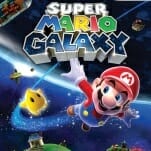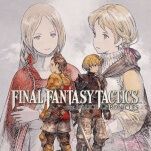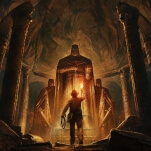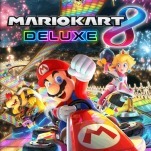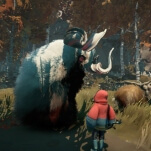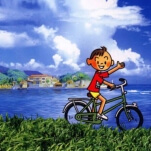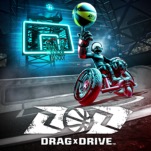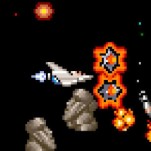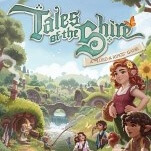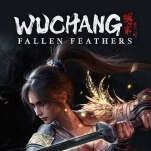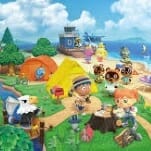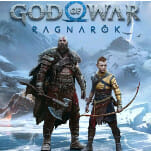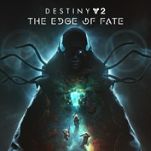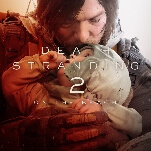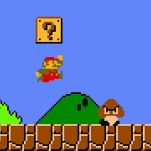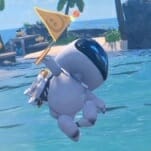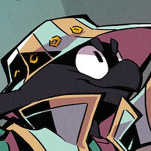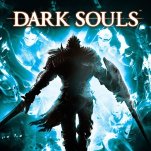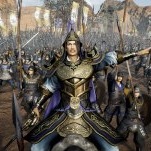Every Boardgame We Saw at Gen Con 2016
Main Image: Islebound, from Red Raven Games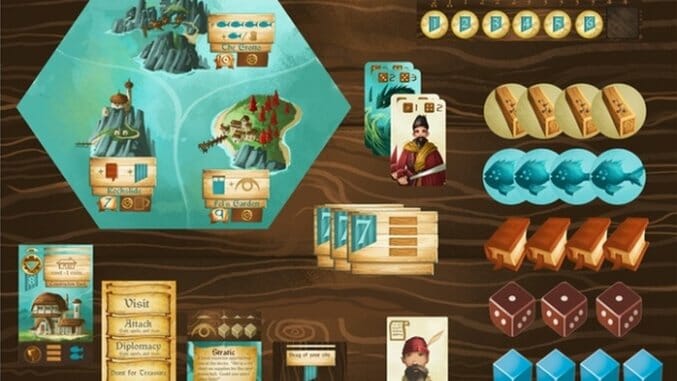
Earlier today we published Keith Law’s list of the best boardgames he saw at Gen Con 2016. Here’s a bullet-pointed rundown of every other game Law saw at the convention, broken down by publisher. If you are a boardgame fanatic, here’s what you have to look forward to over the next several months.
Rio Grande: Tiffin is a great, quick game with a novel theme. Players are trying to complete the bike routes of tiffin delivery boys in Mumbai—tiffins are metal lunch boxes that keep food such as dal, curries and rice hot until they reach their destination—on central cards. Every time the players complete a route, it’s scored; whoever placed the most cubes on that route gets the biggest point bonus. Players draft cards that allow them to place 1 to 4 cubes, usually trying to match the card’s color to the route’s, although each card number has a second ability such as a 4 card also working as a wild 2. There’s also a “competitor” track: Certain cards trigger a neutral player’s turn, placing cubes on the current routes and potentially reducing players’ bonuses when those are completed. It’s out now for about $30. RG has also published the 836th expansion to Dominion, Empires.
Asmodee: Dream Home is a great gateway/family game, as players try to build out their dream homes, balancing both set collection and spatial arrangement, for ages 7 and up; it’s due out in Q4. Captain Sonar is a team-based game set up to pit two teams of four against each other in a kicked-up version of Battleship. 7 Wonders Duel, the two-player analogue to Antoine Bauza’s amazing 7 Wonders game, has a new expansion coming soon called Pantheon. Citadels, the 2000 Spiel des Jahres-nominated game from Bruno Faidutti, is getting an update with fresh artwork this fall. Ticket to Ride: The First Journey is a simplified version of their award-winning, best-selling Ticket to Ride series, with players just drawing cards from the deck, playing on a simpler map with larger text. Inis is a Celtic-themed game of area control involving conflict and card-sharing on a board that changes with every play. Legendary Inventors doesn’t have a release date yet, but is a complex game that offers multiple methods of scoring, none of which can be fully ignored, and a card-completion mechanism gives rewards rather than straight points to players who have the most cubes on those central cards.
iello: Beyond Sea of Clouds, iello also showed off some recent and upcoming expansions for their King of Tokyo/New York series, as well as the upcoming reissue of Reiner Knizia’s Schotten Totten, which most of you will know under the name Battle Line. Schotten Totten is the same game but with an entirely different theme, and the reissue has outstanding new artwork. Oceanos is an upcoming title from Antoine Bauza, aimed at family play, where the players compete to build submarines, finding new species in the water and sending out scuba divers to collect treasures. The artwork is a big selling point here as well, cartoonish and bright to appeal to younger players. iello also demoed Happy Pigs, an economic game released in March that plays more complex than the goofy artwork (square pigs!) might imply; there’s an upcoming expansion that allows players to raise penguins as well as pigs. (I asked if there was also an upcoming bacon expansion but it appears not.)
Stonemaier: Scythe was one of the hottest titles at GenCon, with copies selling out within minutes of the floor’s opening. I watched a live game for about 15 minutes, and I’m not sure I’ve ever actually seen or played a more complex game. Scythe combines resource collection, worker placement, area control, and military conflict in a game that runs 2-2.5 hours and has a rulebook the size of a Russian novel. The sheer number of decisions involved in the game limits the audience, but if you like titles where one play takes up your entire game night, this is for you.
Red Raven: Islebound is yet another pirate-themed game—Sid Meier should get a dime from each of these games sold—where players compete for treasure and crew while exploring an archipelago of island tiles, using diplomats to establish friendly relations with towns on those tiles … or attacking them to take them over. This just missed my top ten list for the event.
Greater than Games: In addition to Bottom of the 9th, GTG showed off two new titles, New Bedford and its two-player micro-game spinoff Nantucket, both of which revolve around the whaling industry of 19th century New England. New Bedford is the traditional game for up to 4 players, a worker-placement game where players build out the town together, collecting food to send out ships for whales, running twelve rounds and up to 45 minutes or so. It includes a solitaire gameplay option as well. Nantucket is a $10 card-game version for two players using coins in place of most of the resources found in New Bedford. It seems tighter and more straightforward than many worker-placement games, a genre that unfortunately has encouraged the “more is more” design philosophy.
Capstone: This publisher specializes in porting medium to heavy complexity titles from Europe that might not be mainstream enough to find a U.S. publisher, and they showed two games at GenCon, the highly complex stock-market manipulation game Arkwright and the medium-high complexity Haspelknecht, a game of coal-mining and resource management that forces players to balance mining operations against the collection of “pit water,” which slows or stops their progress.
Great Northern Games: Council of Blackthorn plays to 2-6 players, competing to earn the favor of the king and not be the player beheaded at the end, so the stakes are somewhat high. (Guillotine not included.) Players try to move themselves up multiple tracks but can try to sabotage other players, and get to bluff with “poison” cards that serve to limit the chances of a runaway winner. There are multiple paths to victory but the rules themselves seemed fairly straightforward; a full game would take an hour to an hour and a half.
-

-

-

-

-

-

-

-

-

-

-

-

-

-

-

-

-

-

-

-

-

-

-

-

-

-

-

-

-

-

-

-

-

-

-

-

-

-

-

-





